- Home
- Mark Frost
The List of Seven Page 10
The List of Seven Read online
Page 10
“You don’t say.”
“Aside from his obvious ignorance, filth, and lack of sophistication, what quality could most recommend to us prehistoric man?”
“He was quite handy with his hands,” Doyle said, struggling to keep up with the man’s mental vaults.
“He was in harmony with the earth,” said Sparks, paying no attention to Doyle’s answer. “At one with nature: part of it, not apart from it.”
“The noble savage. Rousseau and all that.”
“Precisely. And as a consequence, ancient man possessed an exquisite sensitivity to the ground he walked, the woods he hunted, the streams from which he drank. He didn’t need to practice feng shui; he was born with it, innately, as were the animals he depended on for survival.”
“So the paths they traveled fell along the lines of some vibratory pattern in the earth.”
“Crisscrossing the countryside seemingly at random, these paths many constitute nothing less than the electromagnetic nervous system of the planetary being itself.”
“On the other hand, they might just be roads,” Doyle countered.
“Might be. But what if I were to tell you that at the intersections of these lines of force, where the—whatever you might wish to call it; the Chinese call it the ‘breath of the dragon’—where this pulsating energy is at its zenith, early man erected his temples and holy places, on many of which now stand the Christian churches we make use of today?”
“I’d say the whole thing bears further examination—”
“Stonehenge is such a place. Likewise the ancient abbey at Glastonbury. And Westminster Abbey, which was built on the site of the Romans’ Temple of Diana, sits squarely atop the most vigorous nexus of these lines of force in all of England. What does that suggest to you?”
“There’s a good deal more in heaven and earth and so on.”
“Yes, Horatio. Even more intriguing when you consider that the Greek deity Hermes—the ancient Greeks were aware of these forces, don’t you doubt it—was the god not only of fertility, as was Diana, but also of roads. And what did our Celtic ancestors do to honor Hermes? They erected columns of stone at significant crossroads. Mere signposts? Or primitive conductors of this earthbound energy?”
“But the Celts didn’t worship a Greek god,” Doyle contended, growing more confused.
“No, the Celts called him Theutates. But when the Romans completed their conquest of Britain, Caesar himself remarked on how easily the natives had been persuaded to worship Mercury, the Roman version of Hermes. Theutates is depicted as carrying a large staff entwined with a serpent, as are both Hermes and Mercury with the caduceus—”
“Two snakes on the caduceus, actually.”
“And what does the caduceus symbolize, Doyle?”
“Healing. The power of healing.”
“Precisely. Suggesting that if one taps into the power of the serpent, i.e., ‘the dragon’—the lines of force in the earth: the natural force—they gain the power to heal. What if all this talk about ‘dragons’ in Celtic legend wasn’t about literal monsters at all? Do you recall what old Saint George was suddenly able to do after ‘slaying the dragon’?”
“Uh—”
“Heal the sick! Brave knight ventures out, sticks his lance into—not an actual dragon, in our revised scenario, but the ‘coiled serpent’ of natural power. Like dropping a conducting wire into a vast reservoir of energy, thereby taming the ‘beast.’ George then goes straight on to become patron saint of England, it’s graven in our English schoolboy minds! Power, Doyle, the elemental power of the planet, running under, around, and through us even now, and we’re too blinded and distracted by life’s pettifogging natterings to see it!”
Each new idea made Doyle’s brain ache. Perhaps there was a vitality-affecting undercurrent beneath these bricks, and it was draining him dry.
“And what was the first use civilizations tried to make of this force once they’d acquired it? What did we use those ancient temples for? Come on, Doyle, think!”
Doyle hazarded a guess. “Animal sacrifice?”
“Healing! Heal the sick; raise the dead. We appealed to the gods to make us whole; the medical and theological professions were one and the same then. Not unlike two serpents entwined around a straight line of force, come to think of it,” said Sparks, surprising himself with the discovery. “Do you remember who the eldest son of Hermes was?”
“Forgive me, it’s slipped my mind,” said Doyle, feeling slightly dizzy.
“The great god Pan, father of paganism and earth worship, the one the Christians decided to eradicate by calling him the Devil, because poor old, fun-loving Pan also represented that most unchristian of human attributes: unbridled male sexuality.”
“Pity.”
“Granted Pan has his mischievous side; he particularly liked to lie in wait for travelers in desolate areas, jump out of the weeds, and spook the living wits out of them, inducing a feeling in the victim called Pan-ic.”
“I really need something to eat,” Doyle said. The surrounding countryside, in spite of its bucolic, sun-drenched beauty, was beginning to look increasingly threatening.
“Isn’t the mind extraordinary? One loose brick on the road leads us from feng shui all the way to Pan. By God, maybe there is something to the energy of this old road: I feel marvelously invigorated!”
Doyle wiped his brow with a handkerchief as Sparks looked out over the fields, reviewing the crop of his recent thinking like a proud farmer.
“If this lines-of-force business is true, if this road truly is sacred, how do you account for the fact that it’s fallen into such utter disrepair?” asked Doyle, self-satisfied with the sharpness of his rebuttal.
“In that single observation, Doyle, you express with epigrammatic precision the fundamental tragedy of modern man. We have fallen from grace, our ancient, instinctual link to the natural world forgotten. We’re guests who no longer respect the house they inhabit, but rather treat it as a rough clay to be molded to our basest use. Think of the charnel-house factories of London, the befouled air, the mines, child labor; the countless devalued lives broken and discarded by the infernal machinery of the age. The eloquent ruins of this simple country path inscribe the eventual downfall of our vaunted civilization.”
Doyle felt a tingling rush through his body, whether moved by the surprisingly tender outrage of his companion or some combination of starvation and sunstroke, he was quite unsure. It was near midday by now and unseasonably warm. Undulations of heat massaged the horizon line.
“What’s that?” Doyle asked, and he pointed to the road behind them.
They had climbed and descended a sequence of gentle hills as the path moved down through the valley. A dark mirage-like heat devil was fluttering toward them along the line of the road. Its rhythmic, fluid movements suggested the beating wings of a gigantic crow.
“Perhaps we’d better clear off the road,” Doyle said.
“No.”
“Do you think that’s, um, wise, Jack?”
“We’re in no danger,” said Sparks, standing his ground.
Before too long, they could hear beating hooves: a single horse, at a sustained gallop. The shape metamorphosed through the distortion of the heat and revealed itself to be a solitary rider, a long black cloak flowing in its wake. Slowing as it approached, the rider appeared to a startled Doyle as a welcomely familiar face.
“Why, it’s Barry. It’s Barry, isn’t it?” said Doyle, unexpectedly cheered by the prospect.
“No. It’s not Barry,” Sparks said.
He moved away to greet whoever it was as the horse covered the last few paces, and the man, who by every test of scrutiny Doyle could apply appeared to be none other than Barry, their erstwhile driver, dismounted and shook hands with Sparks.
“Good man, Larry, no trouble then,” said Sparks.
“Kept a sharp butchers. N’trouble a’tall, sir,” said Larry, who Doyle still insisted was Barry, not Larry.
�
�Larry is referring to the scattering of berries and wheat I’ve left along the way,” Sparks explained to Doyle, as they moved to him. “There’s not another tracker in all of England who could follow so scant a trail.”
“None that is save y’self, sir,” Larry added modestly. He was an East Ender, wiry and compact, as Barry had been, with the same curly brown hair and lively blue eyes that Barry had; that Barry has, Doyle meant to say, still convinced this could be none other than the man himself.
“Larry and Barry are brothers,” Sparks said, seeing Doyle’s evident confusion. “Identical twins.”
“We were, anyway; Barry’s a one’s wot got the scar, sir, which you’ll notice is distinctly lacking on my physiognomy,” said Larry, helpfully offering up his right, decidedly unscarred cheek to Doyle as testimony.
“Right,” said Doyle. “No scar at all.” As if he’d noticed from the start.
“Larry and Barry are something of a legend in certain London circles,” Sparks said. “The sharpest pair of crack men you’d ever hope to meet.”
“Crack men?”
“Burglars, sir,” said Larry, smiling politely as if discussing tea-party etiquette with a maiden aunt. “Bit a’ the old slash and grab, practitioners of the wedge, jemmy, and center bit, if you get my meanin’.”
“I understand your meaning quite distinctly,” Doyle said, affronted by the man’s casual criminality.
“A perfect partnership,” explained Sparks. “No one knew they were twins. On sheer technique alone they were ten leagues ahead of anyone else in the field.”
“We ain’t educated, but we ’ad an education, if you get my meaning,” elaborated Larry.
“You’ll appreciate the elegance of their methodology, Doyle. One of them goes out on the town and holds forth in a pub, cadging drinks, carousing, generally making a spectacle of himself.”
“And that part’s not the lark you might assume it to be, sir,” said Larry, gravely. “A form of entertainment, that’s how we seen it—emphasis on performance. Barry, now ’e’s a singer, see, wit’ a vast repertoire to draw from, whilst I favored epic recitation of the ribald lim’rick.”
“So while the one’s publicly and visibly engaged, the other brother goes about the fieldwork.”
“That being the targeted burgle, in and out wit’ the grab bag clean as a nun’s wimple,” added Larry.
“Both of them as quick as mice and able to work their way into places you wouldn’t believe humanly possible,” Sparks went on—enjoying himself just a little too much with this story, thought Doyle.
“Barry, see, ’e can dislocate ’is shoulders in a tight spot and collapse ’imself down like an umbrella—”
“They’re never seen together in public, so even if the brother on the job is pinched red-handed, forty eyewitnesses in the pub are ready to swear they spent the evening in the accused’s flamboyant company. Absolutely foolproof.”
“And Bob’s your uncle it was, too, sir,” Larry continued. “That is, till one dark day Barry buys hisself a bit of a hard cheese. Always after the ladies, Barry was: a tragic flaw. On this one particular night, he’s flouncing a fishmonger’s daughter. He’s laid a mighty siege to the citadel of this dolly’s virtue: The more defense she musters, the more engines of war Barry marshals onto the field of honor. Four in the morning, right there in the shop among the sardines. He’s broken through her battlements, overrun the palace guard, and is about to breach her sanctum sanctorum when her old dad barrels in, unexpected like wit’ a catch a’ North Sea haddock, and before Barry can half pull his knickers on, the man whacks a cleaver ’cross his chops, cuts him right to the bone—”
“We can safely leave out the medical details, Larry,” said Sparks.
“Right. Sorry, sir,” Larry said earnestly, searching Doyle’s face for any wounded sensibility.
“There’s a place for the likes of you and your brother,” replied Doyle. “It’s called prison.”
“No question about it, sir. And no doubt that’s where we’d both be languishin’ to this day, deservedly so, if it weren’t for the good graces of Mr. Sparks ’ere.”
“A long story we shan’t belabor the good doctor with at the moment,” Sparks said authoritatively. “Did you spy anyone else on the road?”
“I can say wit’ some confidence that your avenue of escape remains undetected, sir.”
“Welcome news. Now, my friend, what have you brought for us?”
“Beggin’ your pardon, gents, ’ere I am gabbin’, and you must be as parched as a medieval monk’s manuscript.”
It turned out Larry had brought in his saddlebags a great many things that, if he hadn’t been in such poor humor to start, would have gone a long way toward substantially revising Doyle’s judgment of the wayward brothers. Sandwiches to start, numbers of them, in abundant variety: deviled ham, rare roast beef and sharp cheddar, turkey and mayonnaise, mutton slathered in horseradish sauce. And with them packages of nuts and sweets and water and cool beer. And perhaps most welcome of all, a change of dry clothes for them both.
They supped off the road, the horse grazing nearby in the tall alfalfa. Larry brought them up to date on his recent movements. Stationed for the last day and a half at the Cambridge railway office, upon receiving a coded wire from Barry in London—he’d led the pursuers a merry chase halfway back to town before eluding them entirely—Larry had taken to his horse and tracked down Sparks and Doyle off the beaten path. Although Doyle assumed it fell along the lines of employment, he found the exact nature of Barry and Larry’s relationship to Sparks difficult to pin down and felt more than a little uneasy in asking. The proximity of such a clearly criminal personality, however putatively reformed, aroused in Doyle an Old Testament stoniness that the sandwiches and beer did little to dissolve, despite Larry’s sunny attempts to ingratiate himself.
Freshly fortified, and wearing dry shoes again, Doyle and Sparks set off once more down the old Roman road. Larry mounted and rode off ahead of them to perform some undisclosed advance-guard action. The sight of his flapping cloak disappearing over the next hill brought back the memory of a recent and more sinister visitation.
“Who’s after me, Jack? Who’s that man in black I saw last night?”
A seriousness of aspect clouded his disposition. “I’m not certain.”
“But you have some idea.”
“He’s a man I’ve been looking for. Last night was the closest I’ve come to him in many years. He’s the reason I was at the séance the other night.”
“Is he some part of this evil confederacy you’ve alluded to?”
“I believe this man you saw is their field general.”
“It’s someone you know, isn’t it?” asked Doyle, with a flash of intuitive certainty.
Sparks looked at him sharply. To Doyle’s amazement, there was in Sparks’s cool eyes a flicker of fear. Shocking and unexpected.
“Perhaps.” Then Sparks raised a roguish eyebrow with customary confidence, his more familiar self again. This unearthing of genuine fright, its mere presence, humanized the man, bringing him closer to the common ground of Doyle’s understanding.
“Does it occur to you how little reason there is for me to believe anything of what you’ve told me?” said Doyle ungrudgingly.
“Certainly.”
“I have the experience of my senses to rely on, but these tales you spin…why couldn’t there just as easily be a thousand other equally, if not considerably more, plausible explanations?”
Sparks nodded in rueful consensus. “What else are our lives finally but a story we tell ourselves to find some sense in the pain of living?”
“We have to believe life has meaning.”
“Perhaps it can only be as meaningful as our own ability to make it so.”
What a variety of feeling his friend had exhibited in so short a span of time. Doyle found himself amazed again at the violent elasticity of emotion, more mutable than summer weather. And he saw his opening.
�
�I completely agree,” said Doyle. “For instance, I know next to nothing about you, Jack, factually speaking, and yet I’m still able to construct an idea of you—a story of you, if you will—that may or may not bear any relation to who you actually are.”
“Such as?” said Sparks, suddenly keen.
“You’re a man of about thirty-five, born on your family’s estate in Yorkshire. You are an only child. You suffered a severe illness as a boy. You have a lifelong love of reading. Your family traveled extensively in Europe during your youth, spending a considerable amount of time in Germany. Upon your return, you were enrolled in public school and upon graduation attended college at Cambridge. More than one college, I think. You studied, among other things, medicine and science. You play some sort of stringed musical instrument, probably the violin, and you do so with no little virtuosity—”
“This is astounding!”
“You briefly entertained the idea of a career as an actor and may in fact have spent some time on the stage. Military service was an option you also considered, and it’s possible you journeyed to India in 1878 during the Afghan Campaign. While in the East, you spent time studying religions, among them Buddhism and Confucianism. I believe you have also traveled in the United States.”
“Bravo, Doyle. You do amaze me.”
“That was my intention. Shall I tell you how I came to these things?”
“My accent, what trace of it remains, gave away Yorkshire. By my manner and apparent means, you correctly assume I spring from family holdings sufficient to support myself in some comfort, without pursuing a life in commerce.”
“Correct. Your vivid imagination leads me to believe you were invalided in childhood—perhaps the cholera epidemic of the early sixties—during which you entertained yourself by reading voraciously, a habit you maintain to this day.”

 Rogue
Rogue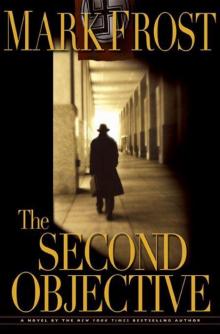 The Second Objective
The Second Objective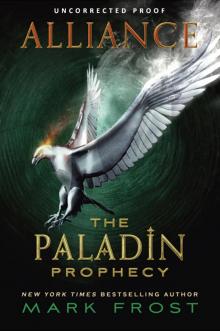 Alliance
Alliance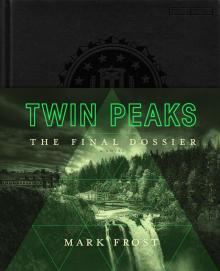 Twin Peaks: The Final Dossier
Twin Peaks: The Final Dossier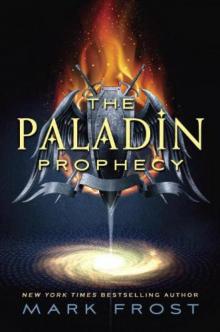 The Paladin Prophecy
The Paladin Prophecy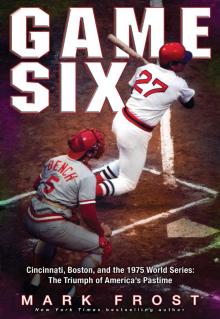 Game Six: Cincinnati, Boston, and the 1975 World Series: The Triumph of America's Pastime
Game Six: Cincinnati, Boston, and the 1975 World Series: The Triumph of America's Pastime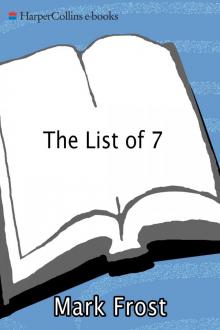 The List of Seven
The List of Seven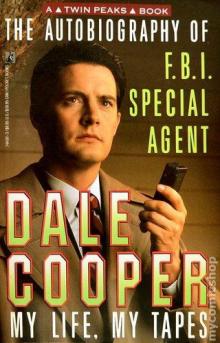 The Autobiography of FBI Special Agent Dale Cooper
The Autobiography of FBI Special Agent Dale Cooper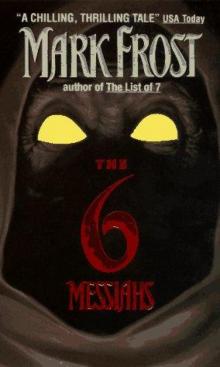 The Six Messiahs
The Six Messiahs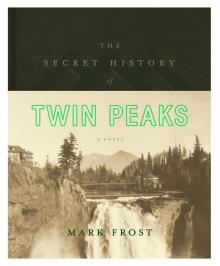 The Secret History of Twin Peaks
The Secret History of Twin Peaks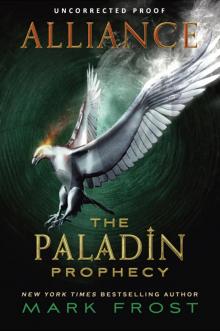 Paladin Prophecy 2: Alliance
Paladin Prophecy 2: Alliance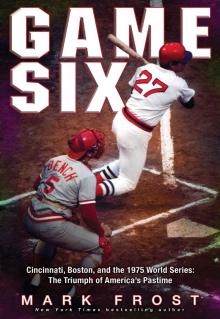 Game Six
Game Six